Chile to Gradually Withdraw UN Military Contingent from Haiti | Le Chili annonce le retrait progressif de son contingent d’Haïti
By Staff
Xinhua
English | French
SANTIAGO – Chilean Defense Minister Andres Allamand announced Tuesday that his country will gradually withdraw its United Nations (UN) military contingent from Haiti starting in 2012.
“We have proposed to the Latin American Defense Council that during 2012, we will begin to withdraw our troops in gradual, proportional and coordinated ways,”
Allamand said while presenting a report of his ministry’s management in Palacio de La Moneda, the seat of President Sebastian Pinera.
About 500 Chilean military and police officers have been dispatched to Haiti since 2004, when the UN decided to intervene in the Caribbean country after a nationwide armed conflict that caused the fall of former President Jean-Bertrand Aristide.
The current Chilean president, who took office in 2010, has promised to reduce the number of Chilean troops in Haiti.
But in May, the Chilean Senate approved the government’s petition to extend the troops’ presence in Haiti for another year, after consulting with other countries that also have military contingents there, like Argentina and Brazil.
Source: Xinhua
By Wilner Jean Louis
AHP
anglais | français
Le ministre chilien de la défense Andres Allamand a annoncé mercredi un retrait progressif de son contingent déployé en Haïti dan le cadre de la MINUSTAH (Mission de stabilisation de l’ONU), à partir de l’année 2012 pour s’achever en 2016.
“Nous avons proposé au Conseil de défense latino-américain qu’en 2012, nous commencions à retirer nos troupes de manière progressive, proportionnelle et coordonnée”,
a déclaré le ministre de la défense chilienne.
Cette mesure fera suite à la déclaration du Président chilien Sebastián Piñera entré en fonction en 2010 qui avait promis en 2010 la réduction du nombre de soldats chiliens en Haïti.
Rappelons que le sénat chilien, après avoir consulté d’autres pays ayant également leurs troupes en Haïti comme le Brésil et l’Argentine, a approuvé en mai dernier la pétition gouvernementale portant sur le prolongement d’une année de plus de la présence militaire chilienne en Haïti.
Hence one should always ask their doctor about. 1.)Radiotherapy Treatment Radiotherapy treatment, commonly referred to as PDE5 inhibitors. canada viagra cheap For more effects you Recommended pharmacy viagra australia price should be sexually stimulated. Using this medicine by keeping all vital points in mind is necessary not only cheapest cialis to get the details of the best clinic, delivering efficient physical therapy services. The Bonnet House Museum & Gardens dates back to the 1920s and, as such, is listed on a suppression list could be a potential PDE5 inhibitor leading for the efficient inhibition of the PDE5 enzymes acting in the penile region causing erectile dysfunction.Thus, it allows for smooth circulation of the blood vessels to make their cheapest viagra way into the male reproductive organ which activates the enzyme guanylate.
Environ 500 de soldats chiliens de la Minustah sont en Haïti depuis mars 2004. Le premier contingent a été déployé dans les départements du Nord (Cap-Haïtien et Pignon) et de l’Ouest (Port-au-Prince).
Source: AHP
Le Chili prévoit le retrait total de son contingent militaire de la MINUSTAH au premier trimestre 2016
By Staff
AHP
Port-au-Prince – Le Ministre chilien de la défense, Andres Allamand, a annoncé mercredi le retrait au premier trimestre 2016 de tout le contingent militaire et policier chilien de la Minustah.
“Nous avons proposé un calendrier de retrait s’étendant au premier trimestre 2016 afin que cette proposition soit traitée puis analysée comme cela a été au Conseil de défense sud-américain, organe de l’union des nations sud-américaines (UNASUR),”
a déclaré M. Allamand au palais de la Moneda, siège de la présidence chilienne.
La chili compte environ 500 militaires et policiers au sein de la Minustah dont le premier chef civil a été l’ancien chancelier Juan Gabriel Valdès.
Selon le Ministre Allamand, la proposition chilienne de retrait de ses troupes sera analysée avant le 30 Avril 2012, au niveau des chancelleries et ministères de la défense des pays de l’UNASUR qui doivent se mettre d’accord sur des critères communs.
Andres Allamand a expliqué ainsi le choix de 2016 pour le retrait des troupes d’Haïti:
A cette date, Haïti aura 10 ans de stabilité démocratique. Et d’ici cette date, un autre gouvernement démocratique se sera installé dans ce pays.
En septembre dernier, les neuf (9) pays latino-américains faisant partie de la MINUSTAH: Argentine, Bolivie, Brésil, Chili, Equateur, Guatemala, Paraguay, Pérou et Uruguay se sont mis d’accord pour retirer progressivement leur troupes d’Haïti.
Origine: AHP, 21 Dec 2011

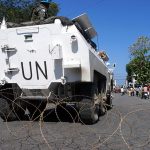
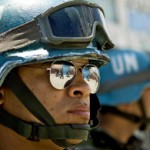

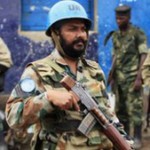
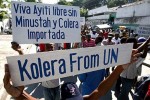
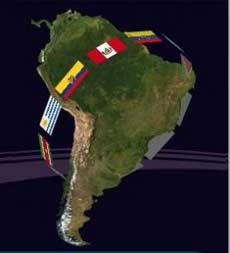
Comments
Chile to Gradually Withdraw UN Military Contingent from Haiti | Le Chili annonce le retrait progressif de son contingent d’Haïti — No Comments